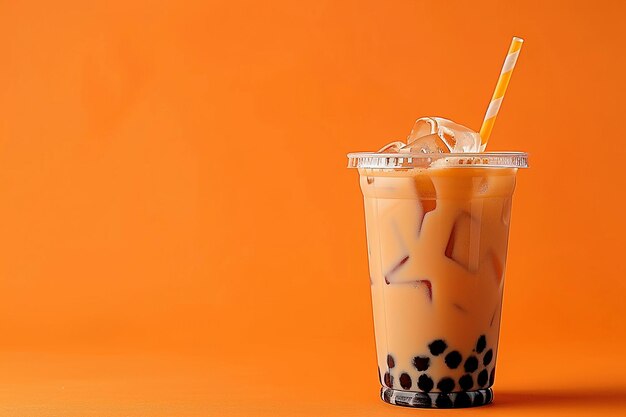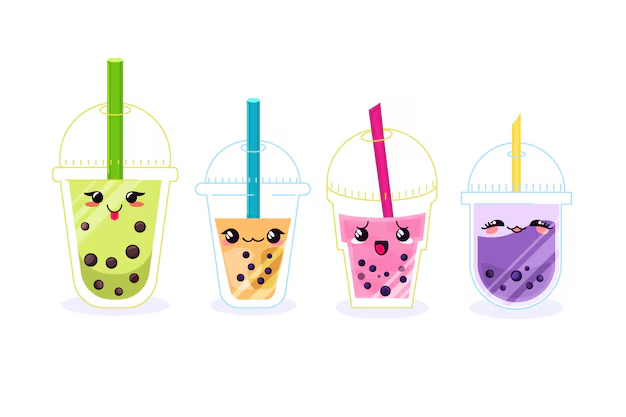Bubble tea, also known as boba tea, has quickly become a favorite drink across the United States. With its unique texture and variety of flavors, this Taiwanese beverage has captured the attention of people of all ages. But one question often arises: does bubble tea have caffeine?
For health-conscious individuals, knowing the caffeine content in bubble tea is crucial. Whether you’re trying to cut back on caffeine or just curious, understanding what’s in your cup matters. In this article, we’ll explore whether bubble tea has caffeine, the factors influencing its levels, and how different types of bubble tea compare.
What Is Bubble Tea (Boba Tea)?
Bubble tea, or boba tea, originated in Taiwan in the 1980s. It’s a refreshing drink that combines tea, milk (optional), sweeteners, and chewy tapioca pearls (also called boba).
Main Ingredients of Bubble Tea
- Tea Base: Black tea, green tea, oolong tea, or fruit teas.
- Milk: Whole milk, condensed milk, or plant-based alternatives.
- Sweetener: Sugar, honey, or syrup.
- Toppings: Tapioca pearls, popping boba, jellies, or pudding.
The tea base is key because it determines the caffeine content in bubble tea. Traditional options like black or green tea naturally contain caffeine, while fruit teas made without actual tea leaves tend to be caffeine-free.
Does Bubble Tea Have Caffeine?

Yes, bubble tea often contains caffeine. The caffeine content depends primarily on the type of tea base used. For instance:
- Black tea: High in caffeine.
- Green tea: Moderate caffeine levels.
- Herbal or fruit teas: Typically caffeine-free.
Does Black Milk Tea Have Caffeine?
Black milk tea is one of the most popular bubble tea flavors. It is made with black tea as the base, which naturally contains caffeine.
- Caffeine Content: A typical cup of black milk tea contains 45–70 mg of caffeine.
- For comparison, a regular cup of coffee has around 95 mg of caffeine.
Black milk tea provides a moderate caffeine kick, making it ideal for those who want a slight boost of energy without overdoing it.
Does Green Tea Boba Have Caffeine?
Green tea boba is another popular variation. Green tea has less caffeine compared to black tea but still provides a mild energy boost.
- Caffeine Content: Green tea boba contains approximately 20–45 mg of caffeine per cup.
If you’re looking for a lighter alternative with less caffeine, green tea boba is a great choice.
Does Taro Bubble Tea Have Caffeine?
Taro bubble tea is known for its creamy, purple appearance and sweet flavor. However, the caffeine content depends on the tea base used:
- If made with black tea: Contains caffeine (around 45–70 mg per cup).
- If made with herbal or milk base: Caffeine-free.
Always check with your bubble tea shop about the ingredients used in taro boba.
Does Thai Bubble Tea Have Caffeine?
Thai bubble tea is made with black tea, spices, and condensed milk. It’s flavorful and creamy but does contain caffeine.
- Caffeine Content: Thai milk tea typically has 45–70 mg of caffeine per cup.
Thai bubble tea is ideal for those looking for a spiced, energizing drink.
Related to Read: Does Iced Tea Have Caffeine? A Complete Guide
How Much Caffeine Is in Bubble Tea?
The caffeine content in boba tea varies based on the tea base. Here’s a breakdown of caffeine levels:
| Bubble Tea Type | Caffeine Content (per 16 oz cup) |
| Black Tea Boba | 45–70 mg |
| Green Tea Boba | 20–45 mg |
| Oolong Tea Boba | 30–50 mg |
| Fruit Tea (No Tea Base) | 0 mg |
For comparison:
- A standard cup of coffee contains 95 mg of caffeine.
- A can of soda has about 30–40 mg.
This table shows that bubble tea has less caffeine than coffee but can still provide a noticeable boost.
Does Fruit Bubble Tea Have Caffeine?
Fruit bubble teas are a refreshing alternative to traditional milk teas. But do they contain caffeine?
- Fruit-Based Bubble Teas: These are often made with fruit syrups, juices, and herbal infusions without any tea leaves. As a result, they are caffeine-free.
- However, if fruit teas include green or black tea as the base, they will contain caffeine.
Always check the menu or ask for clarification when ordering fruit bubble tea. If avoiding caffeine is a priority, opt for pure fruit-based drinks.
How Caffeine in Bubble Tea Can Keep You Awake
Bubble tea can keep you awake, especially if it’s consumed in large amounts or late in the day. This is because caffeine, a natural stimulant present in tea-based bubble tea, affects your central nervous system. Caffeine blocks adenosine, a chemical in the brain that promotes sleep, making you feel more awake and alert.
Caffeine Levels in Bubble Tea
The amount of caffeine in bubble tea depends on the tea base:
- Black tea: 45–70 mg per cup (16 oz).
- Green tea: 20–45 mg per cup.
- Oolong tea: 30–50 mg per cup.
To put it into perspective, a regular cup of coffee contains 95 mg of caffeine, so bubble tea generally has less caffeine. However, drinking multiple cups or ordering large sizes can add up quickly, increasing caffeine intake.
Impact of Late-Night Consumption
Drinking bubble tea late in the day can disturb your sleep schedule. Caffeine can stay in your system for up to 6–8 hours. If you enjoy a bubble tea in the evening, its caffeine content might delay sleep, reduce sleep quality, and leave you feeling tired the next day.
Personal Caffeine Sensitivity and Its Variations
Not everyone responds to caffeine the same way. Caffeine sensitivity depends on several factors:
- Age: Older adults may process caffeine slower than younger people.
- Genetics: Some people metabolize caffeine faster than others.
- Lifestyle: Regular caffeine drinkers may develop a tolerance over time.
For individuals who are sensitive to caffeine, even a small amount can cause jitteriness, increased heart rate, and trouble sleeping. If you suspect you’re caffeine-sensitive, opt for caffeine-free bubble tea options (discussed below).
Caffeine-Free Bubble Tea Options
For readers who are caffeine-sensitive or prefer to avoid caffeine, there are plenty of alternatives available. Here are some caffeine-free bubble tea options:

1. Fruit Teas Without Real Tea Bases
Fruit bubble teas made with fruit syrups, fresh juices, or herbal infusions instead of green or black tea are naturally caffeine-free. Popular options include:
- Mango bubble tea
- Strawberry bubble tea
- Passionfruit bubble tea
These drinks offer the same refreshing taste without the stimulating effects of caffeine.
2. Taro Bubble Tea with Herbal Tea or Milk Base
Taro bubble tea is a creamy and flavorful choice. If it’s made with a milk base or an herbal tea, it will be caffeine-free. Just confirm with your bubble tea shop that no black or green tea is included.
3. Other Non-Caffeinated Bubble Tea Options
If you want a caffeine-free treat, consider these delicious options:
- Coconut milk boba: Made with coconut milk and tapioca pearls.
- Almond milk boba: A dairy-free and caffeine-free option.
- Brown sugar milk tea (without tea): Made with milk and brown sugar syrup.
These alternatives are ideal for enjoying bubble tea without the worry of staying awake all night.
Is Bubble Tea Bad for You?
Bubble tea can be part of a balanced diet if consumed in moderation. However, certain factors may make it unhealthy if consumed excessively:
1. High Sugar Content
Most bubble teas are loaded with sugar. The sweeteners, syrups, and tapioca pearls can contribute to high sugar intake, which may lead to:
- Weight gain
- Increased risk of diabetes
- Dental issues
A standard bubble tea can have up to 30–50 grams of sugar per serving. For context, the daily recommended sugar intake is 25 grams for women and 36 grams for men.
2. High Caloric Intake
A single cup of bubble tea with full-fat milk and tapioca pearls can contain 300–500 calories. Repeated consumption of such calorie-dense drinks may contribute to weight gain over time.
3. Moderation Is Key
Bubble tea isn’t inherently bad for you. To enjoy it healthily:
- Choose less sugar or sugar-free versions.
- Opt for smaller portions.
- Substitute full-fat milk with low-fat or plant-based milk.
- Avoid drinking bubble tea daily.
By making mindful choices, you can satisfy your bubble tea cravings without negative health effects.
Related to Read: Does Chamomile Tea Have Caffeine?
FAQs
1. Does bubble tea have caffeine in it?
Yes, most bubble teas contain caffeine because they are made with tea bases like black tea, green tea, or oolong tea. The caffeine content varies depending on the type of tea used.
2. Does taro bubble tea have caffeine?
Taro bubble tea can contain caffeine if it’s made with black or green tea. If it’s made with a milk base or herbal tea, it will be caffeine-free. Always check with your bubble tea provider.
3. How much caffeine is in bubble tea?
The caffeine content depends on the tea base:
- Black tea boba: 45–70 mg per serving (16 oz).
- Green tea boba: 20–45 mg per serving.
- Oolong tea boba: 30–50 mg per serving.
In comparison, a regular cup of coffee has about 95 mg of caffeine.
4. Is there caffeine in fruit bubble tea?
Fruit bubble teas are usually caffeine-free as they are made with fruit syrups or juices instead of tea. However, if the base includes black or green tea, there will be caffeine in the drink.
5. Will bubble tea keep me awake?
Yes, bubble tea can keep you awake if consumed late in the day. The caffeine content, especially in black or green tea boba, can delay sleep and cause restlessness in sensitive individuals.
Conclusion
Bubble tea is a delicious and versatile drink that often contains caffeine, depending on its tea base. Black tea and green tea boba provide varying levels of caffeine, while fruit teas and milk-based alternatives offer caffeine-free options for sensitive individuals.
If you’re concerned about staying awake or disrupting your sleep, it’s best to enjoy bubble tea earlier in the day or choose non-caffeinated versions like fruit-based or herbal milk teas. Moderation and mindful choices are key to enjoying bubble tea without negatively impacting your health.
Whether you’re looking for an energizing boost or a relaxing caffeine-free treat, bubble tea has something for everyone.

